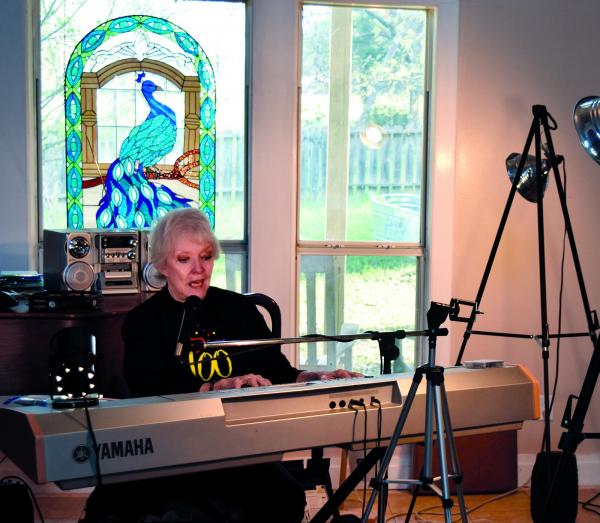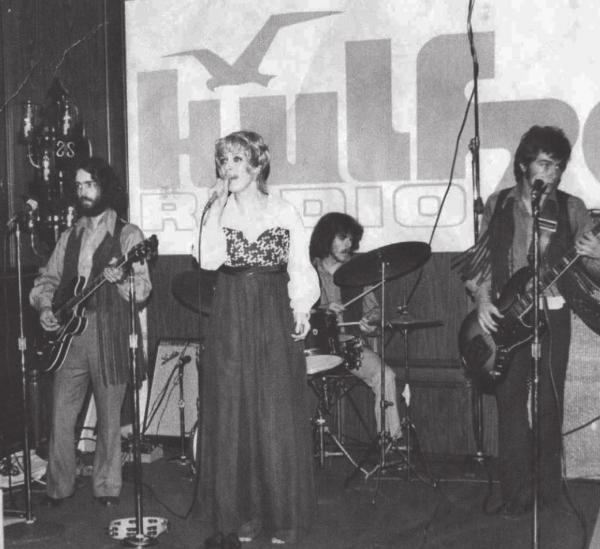The songs of a lifetime
This is the first in a multiple part series on Joyce Webb and her life in the music industry.
Joyce Webb has met and entertained with some of the most legendary names in the music industry. From a television show with Cactus Pryor to moving into Sammy Davis Junior’s home, she’s seen it all, but it wasn’t always the glitz and glitter of show business.
The year was 1943. Little three-year-old Joyce Webb is with her mama in Wharton, during Major League Baseball Spring Training. There was a little diner right next to the tourist court where they lived. They were downright poor, with dad a part-time baseball player and musician.
“We had a farm near Round Rock. My first storebought dress was when I was 14. Our clothes were feed sacks. It was obvious. I didn’t know we were poor.
Everybody had the same material,” Webb said. This included dad’s shirts and mom’s dresses, too.
It was at the café, a mom and pop restaurant, where Webb began to realize her vocal talents. “The soldier boys would eat there… ’You’re a pretty little girl’ (the soldier, said.) I said ‘I could sing a song. Want to hear me?’ And I sang ‘Jesus loves me.’ He gave me a quarter… Other soldiers asked, and I sang ‘Paper Doll.’
“I left with a pocketful of money that night. When daddy got home, mama said, ‘look what Joyce did tonight.’ There was about $5 on the table. Daddy said, ‘What in the world; Let’s go out to eat.’ And I paid for it.”
“It was a Blue-Plate open face beef sandwich. Ice tea for a drink and for dessert, banana pudding, all for 75 cents. ‘It’s not so hard to make money, dad.’”
It was very unusual to go out to a restaurant, with the family being poor. It was just a small taste of the good life, a hint of the good things (and not so good) things to come.
Joyce had a talent for music that none of her three siblings were born with. Her siblings were a lot older than her, and she was the baby. “Momma bought me a purse, and I would say, ‘when the purse is full, we can go home, (from the diner).’ That was 78 years ago.” During the off-season of baseball, the farm where they lived was located around Round Rock and at six years old they moved to Austin. Their house was very close to the University of Texas.
Meeting Bobby Doyle at 13 years old was a milestone in her life. Her older brother and Bobby’s older brother were friends, so it was just natural they became best friends until his death in 2006. Bobby was a junior high student at Texas School for the Blind, but entered regular school as a classmate with Joyce and throughout their careers they remained close.
“I had choir in junior high school. I was so blessed… I was in the right place. I got into a pilot program at the University of Texas.” Being poor, but identified as a gifted and talented student, she was asked as what interested her.
“I already played piano, never had one lesson. If I heard it I could play it. My brother and two sisters can’t do that. How to explain it? It’s in my ears and comes out through my fingers,” she continued.
“We were experiments for UT… In junior high, I walked to my music classes at UT. I would go to the music library and check out any instrument I wanted.” She took any class available including classes on Composition and Theory. “I ruined the curve for the UT students.”
Then the performance part of her musical training came from a friend of hers whose father had a Big Band and was slated to play at a Country Club. Their girl singer got the mumps and he needed a replacement immediately.
Her friend asked her, ”You’re a singer, right? Do you know ‘Blue Moon’ and ‘Stormy Weather?’” The father then asked her, “I do the first four bars and then you come in?”
“‘Yes sir,’” she replied. “My brother, who was 12 years older, was my chaperon, and it was $15 for two or three songs.”
The girl she replaced was fired, and she was asked if she could work Friday and Saturday nights at the Country Club. “I didn’t date, and I was not going to turn down a job. I gave my check to daddy.”
When she was in junior high, while singing over the marching band at school, Cactus Pryor happened to be on campus and heard her sing as lead singer of the choir, “Birth of the Blues.” That led to a weekly TV program.
Back in 1954, the Lyndon Johnson family owned Austin’s only TV station, KTBC, channel 7. The station was very small, but it was the only one in Austin, and it broadcast a mixture of network shows.
“Cactus Pryor and I had a TV show together. ‘Now Dig This.’ It was like ‘Bandstand.’ I would sing and lip sync songs.” Cactus asked her what else could she do. “I can dance,” was her reply. And she could. Her brother was a dance teacher at Arthur Murray, a dance school, and knew all the latest dance moves. She could even tapdance. Then it was the next step in her career.
Domino Records had signed her to a professional record contract. She was on the million selling single by the Slades, “You Cheated, You Lied,” when she was only 17. “I sang the doo-wop, doo wop part. I got to go to American Bandstand, and I rode on a plane for the first time.” Her friend Bobby Doyle was also on the record as he played bass.
Getting noticed in a small town like Austin, it was time to move to a little bigger pond. Doyle urged her to move to Houston. “I was a big fish in a little pond.” The pond was a little bigger and opportunities were abundant. Joyce played with Bobby’s trio along with Kenny Rogers and Don Russell.
There was a move to Houston, but she was still popular in Austin. She became wellknown and booked at the old Villa Capri Club where she appeared with Steve Allen’s Tonight Show crew since they all had the same management. She was the warm up act for: Louie Nye, Don Knotts, Tom Poston and Bill Dana. With Henny Youngman, she did the song, ‘The Man I Love.’
Joyce singing: Someday he’ll come along.
Henny: Who’s that?
Joyce singing: The man I love.
Henny: What does he look like?
Joyce singing: And he’ll be big and strong.
Henny: Who’s that?
Joyce singing: The man I love.
Henny: What will he do?
Joyce singing: He’ll build me a house.
In Houston, at Happy Hour 5:30 until 7 p.m. It was at the early show “Kenny (Rogers) and I appeared as duo at 2016 Main in Houston, (a major club). Kenny got in trouble with the I.R.S.”
He was short of money and the Happy Hour Show’s pay was “under the table,” for the cash strapped Rogers.
“All the musicians came to see us… People were waiting in line… Saturday early it was the place to be, I was getting record offers, everything was falling in my lap.”
Soon Joyce got a call from Los Angeles, while working in Austin at the Villa Capri. “I was onstage and the waiter called me over. ‘You have an emergency phone call’ in the middle of the show. It was Leonard Reid, an A&R man.”
“I’m not speaking for the record label,” he said. “We can’t find a girl in Los Angeles. You’re perfect with that look.’”
It seemed that one of the girls in the New Christy Minstrels had gotten pregnant and the show needed “one now,” for the ‘Andy Williams Show’ and their weekly appearances or ‘sit down’ job, a gig with a weekly paycheck, not on the road. “Reid said, if she can’t do it, she’ll learn how to do it.” The job did not last a whole season. Williams’ show was soon canceled and it was back to Houston. Joyce had quit the New Christy Minstrels as she didn’t want to tour again and wanted to stay put in Houston to provide some stability for her daughter Shelle.
In a bit of irony, on the Houston part of their tour, the New Christy Minstrels visited Joyce and her new group. While there, they signed Joyce’s bass player Kenny Rogers to the touring group. “The Christy Minstrels came to see me, heard us and stole Kenny for the group.”
But once again Doyle soon had great news. Things in Los Angeles suddenly looked up. Getting a job at “The Factory,” was a Los Angeles watering hole for celebrities and movie stars that were frequently in attendance. They were also booked one night a week at the Troubadour
The Factory was the near private place to see and be seen. “Oh my God, the people that listened to us, Omar Sharif, the Sinatras,” she continued.
“Omar Sharif, I almost fell off the stage. I didn’t know him, but he came up. He had the darkest eyes, I had to look down. He asked ‘Do you know Son of a Preacher Man?’ Man he was gorgeous! Ali McGraw and Steve McQueen, Nancy Sinatra, there were a lot of them. They’re staring at us! What is this? We’re the peons” The big stars were staring at them, which was an different situation for those used to the situation being the other way around.
“Sammy Davis met and loved Bobby Doyle. Both Bobby and I were sitting at the bar between sets. Bobby had a Bushmill. Sammy said ‘I’m hearing some talented people tonight. Do you arrange, too?’ Bobby said ‘Yeah.’ At the next break, would you have a drink with him, we were asked.” Of course the answer was “Yes!”
“Sammy asked ‘Where are you living?’ Howard’s Weekly Apartments. Sammy said, ‘Mai Britt and I are moving to England. Would you like to live in my house? I don’t want it empty.”
At the time Sammy Davis married white actress Mae Britt, and because of prejudice, decided to move to London. Since the mansion would be empty Sammy told them to move in for free, which they did.
“It had nine bedrooms, a movie theatre, pool. After all, it was Sammy’s place, a big room to rehearse. We moved from Howard’s (Weekly Apartments) to Sammy (Davis Junior’s house).”
One little matter though, the movie vault was locked and Sammy forgot to leave the key behind.
Then they signed with Sammy Davis Enterprises. “Next thing I knew, the Tonight Show, Today Show, Joey Bishop’s talk show,“ Joyce said.
“If Sammy knew you, it opened doors, like Hugh Hefner’s ‘Playboy After Dark.’”
In her mid-twenties, which were in the mid ‘60s, her appearance on Hugh Hefner’s television show ‘Playboy After Dark’ was memorable. This was even though the show was not broadcast in Texas.
On the show, she remained calm and gave advice to a man who looked out of place. Advice such as: to not be nervous and everything will be all right, and the like. Well, lo and behold the nervous man turned out to be Hugh Hefner himself.
But it was back to Houston, and a soloist stint with the Houston Pops for 10 years before she went on to open Wimberley Stained Glass. For those interested in getting a glimpse of the singer’s talents, weather permitting, she’ll be out in front of the shop Ceremony right off the Wimberley Square this Saturday afternoon.



